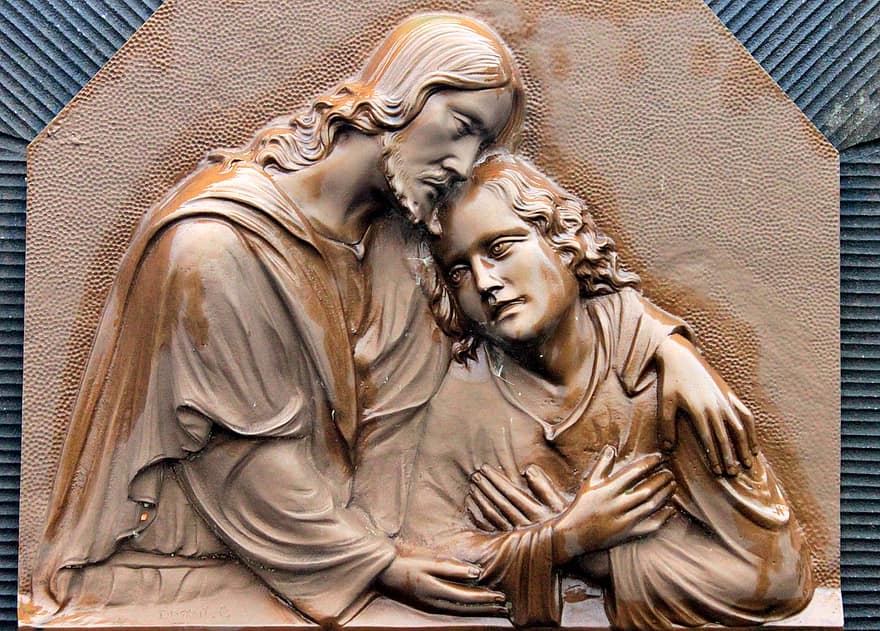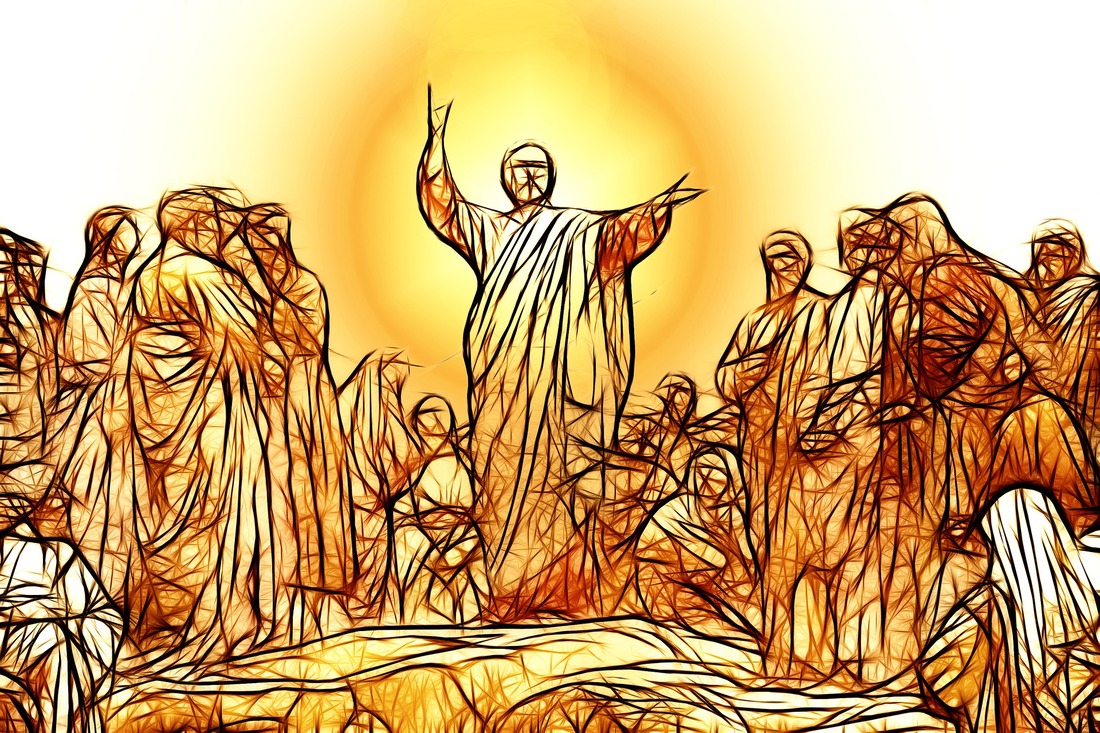|
Greetings to you! The theme for our morning’s meditation is “The source of truth and purity is in the heart.” In the passage today from the Gospel of Matthew , Jesus reminds the disciples that he had not come to abolish the law which was given to them. But rather that he had come to fulfil it. Jesus was talking about being obedient to the spirit of the law rather than to the letter of the law.
The problem at that time particularly with the Scribes, the Pharisees and the teachers of the law was that they were ready to keep the letter of the law but not the purpose for which the law was actually meant. Jesus goes on to give them the actual meaning of the law with reference to adultery, divorce, oaths. Jesus teaches the disciples about the seventh commandment which is, ‘You should not commit adultery’. Jesus says, ‘But I say to you that everyone who looks at women lustfully has already committed adultery in his heart’. “If your right eye causes you to stumble, gouge it out and throw it away. It is better for you to lose one part of your body than for your whole body to be thrown into hell. And if your right hand causes you to stumble, cut it off and throw it away. It is better for you to lose one part of your body than for your whole body to go into hell”. Here again we see the Pharisees and the scribes and the teachers of the law limited the scope of this commandment. They believed that only if a man committed physical adultery, he was guilty of breaking this commandment even though coveting another man’s wife is prohibited in the tenth commandment. They had a conveniently narrow definition of sexual sin and a conveniently broad definition of sexual purity. Jesus again goes to the heart of the matter just as we can commit murder with our words so also we can commit adultery with lust in our hearts and minds. Jesus is not denying the natural sexual relationship within marriage but rather about unlawful sex outside marriage whether practiced by married or unmarried people. Jesus does not forbid us to look at a woman, but forbids us to look at her lustfully. Any fantasising or imagination of sexual relationships with a woman who is not your spouse is to commit adultery. So any sexual practice which is immoral in deed is also immoral in our looks and our thoughts. Jesus shows us that it is the eye which instills lustful thoughts in the heart and makes us commit adultery. The eyes of the heart are stimulated by our physical eyes. God wants sexual purity not just by avoiding physical adultery but in our thoughts and hearts by avoiding lustful thoughts. The danger with lustful thoughts is that it would lead us to unfaithful alliances and being sexually immoral. Jesus then goes on to teach us how to deal with temptations of lust. He says that, “If your right eye causes you to stumble, gouge it out and throw it away. It is better for you to lose one part of your body than for your whole body to be thrown into hell”. And similarly, he talks about the hand. What does Jesus mean by this? Jesus does not mean that we should mutilate our eyes or our hands if they lead us to sin. What does he mean by using this metaphor? It is radical, ruthless moral self denial. It means that as disciples of Christ, we are to reject sinful practices so resolutely that we die to them or put them to death (Mark 8:34; Romans 8:13; Gal. 5:24; Col. 3:5). What Jesus is saying is if temptation comes through your eyes then don’t look! If your feet lead you to sin in a particular place then avoid that place. In our own context with the flooding of pornographic material on the internet it is very easy to fall into sexual sin. Pornography degrades women and treats them as sex objects and presents to our eyes unnatural sexual stimulation. If our eyes feast on these pictures then we are not only sinning but inviting disaster. Jesus therefore calls us to deal radically with sexual sin in our life. The next area that Jesus talks about is about religious oaths. The Pharisees had worked out an elaborate formulae through which they stated that an oath was valid if it was sworn using the formula by using the Lord’s name, or Jerusalem or the earth. If the oath was not kept, they would claim that they have not invoked the name of the Lord and therefore were blameless. Jesus on the other side, calls for integrity in all our speech. Jesus says, “And do not swear by your head, for you cannot make even one hair white or black. All you need to say is simply ‘Yes’ or ‘No’; anything beyond this comes from the evil one”. By stating this, Jesus is saying that our words must be credible. People should be able to take us at our word rather than having to swear on something or someone else. A Christian’s word must be credible and people should be able to trust us. We are to deal radically with our lustful thoughts which lead to sexual sin. Jesus calls us for a deeper righteousness and inner purity which will reflect the heart of God. May God truly help us to obey the spirit of the law rather then the letter of the law. Shalom Paul Swarup Video - Sermon (Hindi) Video - Sermon (English) Download English Version This passage of scripture is one of the well known parts of the teachings of Jesus which even Mahatma Gandhi was influenced by. However, it is not understood very easily and few people care to obey it. The challenge which comes at the end of the section is not to be just hearers of God’s word but be doers of it. This what Jesus wanted his disciples to be and to do. He wanted them to be distinct and different from the world and therefore this Sermon on the Mount can be defined as Christian counter culture. (John Stott) In the midst of a chaotic world there needs to be a search for a cultural alternative. This search is guided by the Holy Spirit who leads us into a lifestyle based on the values of the kingdom of God. Young people are constantly looking for the right things but in the wrong places. They do not see the church as a place which makes life, love and peace as a reality. The church unfortunately has conformed to the world and is not being counter-cultural. The church was meant to be a ‘holy’ people set apart from the world to be distinct and different. However, the church has been like the world rather than being distinct. The challenge in these passages for the disciples of Christ is to shine in the midst of darkness. Our righteousness is to exceed that of the scribes and Pharisees in our ethical behaviour and religious devotion. The believer is to be distinct from the nominal Christian and the secular world. They are to portray what it means to be under the reign of God and live as the children of God. Matthew 5:1-12 is called as the beatitudes. The idea is of being blessed or happy. In Jesus’s view, blessedness does not come from what we own but rather the inner qualities of life which will make us blessed. The name ‘Sermon on the Mount’ is given for this passage because it was given on a mountain top from a vantage point from where Jesus could see all the people and he too was visible to the hearers. I. Repentance "Blessed are the poor in spirit, for theirs is the kingdom of heaven.” Initially meant to be the materially poor - the needy had no refuge but God. Psalm - this poor man - a person who is unable to save himself and therefore looks to God for salvation. The idea is of someone who is stripped of all that he has materially that even in his spirit he cannot think of anything changing his circumstances. His inner spirit has been broken. The poor in spirit could also mean acknowledging our spiritual bankruptcy before God. The Publican who would not even lift his head and said - Lord have mercy on me a sinner. Lk 18:10-14 Church at Laodicia - who thought that they were rich and prosperous - I know that you are wretched pitiable, poor blind and naked. Rev. 3: 14-21. Nothing In my hand I bring, Simply to the cross I cling; Naked come to thee for dress; Helpless, look to thee for grace; Foul, I to the fountain fly; Wash me, Saviour or I die Those who rely on the mercy of God are the poor in spirit. For God’s rule which brings salvation is a gift as absolutely free as it is utterly undeserved. It is purely by the grace of God that we are saved. The time of painful loss will be overturned and they will benefit from the comfort of God. This too is the coming of the Kingdom of God for the poor in spirit. The poor in spirit will be those who sense the burden of their present (impoverished) state, and see it in terms of the absence of God; who patiently bear that state, but long for God to act on their behalf and decisively claim them again as his people. To people like this belongs the kingdom of heaven which has now drawn near. App. God will overturn situations and intervene on behalf of the poor and the needy in spirit. Blessed are those who mourn, for they will be comforted. It is not the sorrow of bereavement that Christ is talking about, but the sorrow of repentance – a state of contrition. Jesus wept over the sins of others NRS Philippians 3:18 For many live as enemies of the cross of Christ; I have often told you of them, and now I tell you even with tears. 1662 BCP Cranmer – we acknowledge and bewail our manifold sins and wickedness. Paul groans about himself in Rom 7 – ‘What a wretched man I am’. Mourners who bewail their own sinfulness, will be comforted by the only comfort which can relieve their distress, namely the free forgiveness of God. Blessed are the meek, for they will inherit the earth. Humble and gentle attitude towards others. Sometimes we are willing to acknowledge our sinfulness and weaknesses before God, but if someone else says something then we have a big problem. Dr. Martyn Lloyd Jones says, ‘Meekness is essentially a true view of oneself, expressing itself in attitude and conduct with respect to others… The man who is truly meek is the one who is truly amazed that God and others think of him as well as they do and treat him as well as they do. They will inherit the earth - the whole thing is contrary to what the world teaches us. Society teaches us to be aggressive and be go-getters always getting the better of others. Ps 37 :1 Do not fret because of the wicked; do not be envious of wrongdoers, Psalm 37:7 Be still before the LORD, and wait patiently for him; do not fret over those who prosper in their way, over those who carry out evil devices. Wait for the Lord for vindication is always with God. II. Righteousness Blessed are those who hunger and thirst for righteousness, for they will be filled. Spiritual hunger is characteristic of all God’s people. Righteousness – Legal, Moral and Social Legal Righteousness – Justification – a right relationship with God. Moral Righteousness - Righteousness of character and conduct which pleases God - contrasted with Pharisaic righteousness. Pharisees were interested in external conformity to rules – contrasted with inner righteousness of heart mind and motive. Social Righteousness – seeking the liberation for human beings who are oppressed. Promotion of civil rights, justice in law courts, integrity in business and honour in home and family affairs. Blessed are those who are persecuted because of righteousness, for theirs is the kingdom of heaven. Persecution is a token of Christian genuineness and authenticity. The condition of being despised and rejected, slandered and persecuted, is as much a normal mark of Christian discipleship as being pure in heart or merciful. Lk 6:26 Woe to you when all speak well of you. “Blessed are you when people insult you, persecute you and falsely say all kinds of evil against you because of me. Rejoice and be glad, because great is your reward in heaven, for in the same way they persecuted the prophets who were before you”. (Matt. 5:1-12 NIV) III. Reconcilers Blessed are the merciful, for they will be shown mercy. Mercy – Compassion for people in need – Classic example is the good Samaritan. If you forgive then your heavenly father will also forgive – Example – the unforgiving servant. Nothing proves more clearly that we have been forgiven than our own readiness to forgive. Blessed are the pure in heart, for they will see God. Popular interpretation is of inward purity. Create in me a clean heart O God and renew a right spirit within me. Pure in heart are the ones who are single minded in their purpose. In their relationships with God and human beings they are absolutely transparent. No masks as many of us would like to wear. Blessed are the peacemakers, for they will be called children of God. Peace-making is divine work, for peace means reconciliation and God is the author of it. God made peace with us at immense cost even at the price of his only son. Peace normally comes through pain – pain of having to apologize to the person whom we have hurt; pain of rebuking the person who has injured us; nagging pain of having to refuse to forgive the guilty party until they repent. Sometimes the struggle involved in reconciling two parties. There is the pain of listening, of ridding ourselves of prejudice, risking misunderstanding. The beatitudes paints a comprehensive portrait of a Christian disciple. One who acknowledges his spiritual poverty and mourns over it. He is meek and seeks the good of others and has a sincere and pure attitude. He thirsts for righteousness, shows mercy to those battered by adversity and sin. He is a peacemaker. In spite of all this he is persecuted. The values and standards are in direct conflict with the values and standards of the world. The world judges the rich to be blessed, not the poor; the happy go lucky, not those who take evil seriously and mourn over it; the strong and the brash not the humble and meek; the full not the hungry; those who attain their ends even if necessary by devious means. God wants us to imitate his character by being distinct and different in our day to day life by being counter cultural as described in the Sermon on the Mount. Shalom Paul Swarup Video - Sermon (Hindi) Video - Sermon (English) Download Hindi version Download English version Today is Trinity Sunday, the Sunday after Pentecost. A day when Christian church has historically celebrated one of its central beliefs …that of a Triune God. We meditate on the theme of “God the Holy Trinity” this morning. It is a day to thank God, the Father, the Son and the Holy Spirit who together form the God-head. The word ‘Trinity’ is not mentioned in the Bible. Trinity is not easy to comprehend. Is it one God in three persons? or three in one person? How do we understand this doctrine? Augustine, one of the greatest and earliest theologians of the Christian faith said, “Any one who denies the Trinity is in danger of losing their salvation…. And anyone who tries to understand it is in danger of losing their mind.” The truth is that it is great mystery. It took the church nearly three hundred years to complete the wording of Trinitarian Orthodoxy producing the Nicene Creed which we recite every Sunday morning. A simple way of understanding the Trinity is to think of water in its various forms. Water can exist as vapour and also as ice apart from existing as water itself. However, the component will be only H2O. Another symbol that can be used to understand is an equilateral triangle. There are three distinct and different angles, angle A, angle B and angle C. All of them are sixty degrees, they are equal but each angle is different but form the one and the same triangle. So also, it is with the Trinity. God the Father, God the Son and God the Holy Spirit are distinct and different persons but yet the same. The substance and character of all three remains the same. In this passage, we see God appearing to Mosses and telling him that he appeared to Abraham, Isaac and Jacob as God Almighty (El Shaddai). But by his name the ‘LORD’ (YHWH). He had not revealed himself. It is only through the Exodus event that we know Yahweh. The message that Yahweh gives to Moses for the discouraged Israelites is the charter of freedom from Egypt. It shows that God was going to free and redeem the Israelites from slavery. Once he does that, he was going to enter into a special covenant relationship with them. He will be their God and they will be his people. The people of Israel will also know who Yahweh his by his Mighty acts and he would keep this solemn promise to give Abraham and his descendants the land of Canaan. These four themes can be traced throughout the Old Testament in New Testament as the basic elements of God’s plan of salvation. In this we see that the Father is involved in the world of redemption, covenant relationship and revelation of his power. In Mark’s gospel 1:7-13 we notice the baptism of Jesus by John. John says very clearly that the one who will come after him would baptize them with the Holy Spirit. He acknowledges the power of the Holy Spirit that would be made available to the people. Secondly, we notice that heaven was split apart. Mark uses skidzo instead of anoigo which would have been the normal word for open. This is again picked up when the curtain in the temple is split open (skidzo). Jesus makes possible our redemption and our relationship with the father by splitting open the heaven and giving us access to God. Moreover, the heavenly voice says, “You are my Son, whom I love; with you I am well pleased.” So, we see the revelation of Jesus as the Son of God. In the book of Romans, Paul says, “If the Spirit of him who raised Jesus from the dead is living in you, he who raised Christ from the dead will also give life to your mortal bodies because of his Spirit who lives in you”. We also see in Ephesians 1:19-20 where Paul says, “His incomparably great power for us who believe. That power is the same as the mighty strength he exerted when he raised Christ from the dead and seated him at his right hand in the heavenly realms.” So, immense power is available to us. Because the Spirit of God is available to us, we have an obligation to put to death our sinful nature. We are not to live according to the sinful nature wasting our time in chasing after the desires of the flesh. The outcome of following our sinful nature will be death. It will result definitely in eternal death and sometime in physical death. The Spirit also endorses our redemption by giving us the right to be called the children of God. The Holy Spirit enables us to stay in this relationship with Jesus and empowers us. We are heirs of God and Co-heirs with Christ if we share in his suffering in order that we may share in his glory. The Holy Spirit is the one who removes the veils of our hearts and eyes so that we may truly see Jesus as God in human flesh and believe in him. God the Father, God the Son and God the Holy Spirit are involved in our Redemption, our Relationship, in Revelation and in Release of power to us. May we truly allow the Trinity to work in our lives so that we may become more like Christ. Shalom Paul Swarup Video - Sermon (Hindi) Video - Sermon (English) Download Hindi version Download English Version |
Archives
May 2024
|



